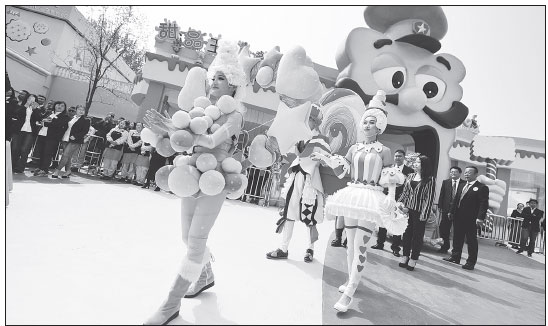Discord breaks out in dispute over Athens Olympics song
The Beijing Chaoyang District Intermediate People's Court recently heard a copyright dispute concerning Beijing Happy Valley, the popular amusement theme park located in the capital city.
At the center of the case was the song Pass the Flame, composed for the 2004 Athens Summer Olympic Games in Greece, by composer and producer Trevor Horn in collaboration with Lol Creme.
It was claimed that the two musicians' membership in the Performing Right Society in the United Kingdom enabled them to enjoy the exclusive right to license the copyright to their musical works, including live performances and those reproduced by devices, according to the Music Copyright Society of China.
The Chinese copyright group said it had signed an agreement with the UK organization, to represent it in China.
The MCSC claimed that Beijing Happy Valley amusement park, operated by Beijing Century OCT Industrial, a subsidiary of Shenzhen-headquartered company Overseas Chinese Town, used the Olympic song as its background music without authorization.
It filed a complaint against the Beijing company with the Chaoyang district court, claiming 50,000 yuan ($7,240) in damages.
China Intellectual Property News, a Beijing-based newspaper, quoted an anonymous attorney representing the MCSC, saying that before the litigation, the group sent the company a lawyer's letter in May 2017 but received no response.
The defendants asserted at the court hearing that the MCSC failed to prove that the musicians were members of the UK's Performing Right Society when the music was released in 2004, and thus it had no legal grounds to claim the music's copyright.
The company also challenged the evidence, a notarized disc recording of the music. It told the court that the disc merely contained audio and could not prove that the location where the music was played was the amusement park.
In addition, the company claimed that the two parties were in discussions in 2006 and signed a three-year licensing agreement starting from 2009.
The original quotation was 80,000 yuan annually, the company's attorney said. After rounds of negotiations, the license fee was subsequently dropped to 30,000 yuan.
After the contract expired, the company failed to contact the MCSC and was unable to pay, he said, denying "malice" in the dispute.
This is not the first case involving the two parties. The MCSC filed a music copyright complaint against a Shanghai subsidiary of OCT with the Shanghai Xuhui District Intermediate People's Court in July, alleging the latter's unauthorized use of music at Shanghai Happy Valley, which the company operates.
On that occasion, the court ruled in favor of the MCSC, ordering the Shanghai company to pay more than 10,000 yuan in copyright licensing fees and other expenditure.
The MCSC said it would continue to initiate legal procedures against other theme parks that have used its members' creations without authorization, which would be a focus of its work.
Experts said the reason that theme parks are sued vary, ranging from their designs and exhibits to performances, background music and commodities sold in shops within the parks.
They added that frequent intellectual property litigation could stain the brand name of theme parks and damage their growth in the long run.
They called for increased IP awareness and encouraged the parks to create their own IP and enhance their competitiveness through innovation and improved services.
|
The Beijing Happy Valley is a popular tourist attraction. Provided to China Daily |
(China Daily 10/18/2018 page17)















